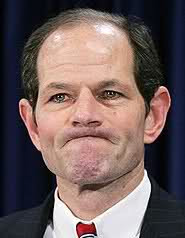THE KRUGLANSKI FOLLIES: IS A BABY THE IDEAL PERSON?
By John J. Ray (M.A.; Ph.D.)
One of the joint authors of the much remarked (for all the wrong reasons) "Berkeley study" of conservative psychology (published in The Psychological Bulletin and called "Political conservatism as motivated social cognition") was one Arie Kruglanski (officially called a "Distinguished University Professor"). He has for a long time been saying that conservatives have a need for a simplistic view of the world. He calls it "Need for Closure" and says that such needs are a sign of psychological maladjustment or weakness. Many other psychologists agree with him (e.g. Kossowska & Van Hiel, 2003). So let us look at the set of statements that Kruglanski (Kruglanski, Webster & Klem, 1993) uses to detect good or bad mental health. For copyright reasons I cannot reproduce them all but a few excerpts tell the story well enough. Here are some of the allegedly "unhealthy" statements:
I find that a well ordered life with regular hours suits my temperament.
I feel uncomfortable when I don't understand the reason why an event occurred in my life.
I don't like to go into a situation without knowing what I can expect from it.
When I am confused about an important issue, I feel very upset.
I usually make important decisions quickly and confidently
I don't like to be with people who are capable of unexpected actions.
I dislike it when a person's statement could mean many different things
I'd rather know bad news than stay in a state of uncertainty.
I would call all of the above statements expressions of normal, healthy, adult attitudes myself. So let's look at what Kruglanski thinks is particularly healthy:
When I go shopping, I have difficulty deciding exactly what it is that I want.
I tend to put off making important decisions until the last possible moment
I would describe myself as indecisive.
My personal space is usually messy and disorganized
I tend to struggle with most decisions
So being a messy, indecisive and disorganized ditherer is healthy! Clearly, capable confident, can-do people are what Kruglanski dislikes and babyish, helpless people are his ideal. I suppose the more babyish we are the easier it is for others to push us around and make our decisions for us -- and Leftists like that. There is another critique pointing out that Kruglanski does not know what he is doing in Neuberg et al. (1997) and my demolition of the Jost et al (2003) study is here.
One point I might also mention here is that Jost, Kruglanski & Co were much enamoured in their Psychological Bulletin article of Glenn Wilson's 1973 book, The psychology of conservatism. I actually wrote chapter 2 of that book so I know a bit about it. The theory Glenn put forward at that time was that conservatives have a greater fear of uncertainty than Leftists. So one would think that conservatives would be more fearful overall. There is, after all, a lot of uncertainty in this world. The EVIDENCE is, however, that conservatives are no more fearful overall than anybody else. Kruglanski & Co would no doubt argue that the lack of overall fearfulness among conservatives is because conservatives have adopted successful strategies to deal with their fears but isn't it odd that there is NO SIGN of such greater fear except via the sort of hokum I have pilloried above?
Finally, for a bit of humour, I might mention some findings of that very hard-working Belgian psychologist Alain Van Hiel. He recently joined with a Polish colleague to test the Kruglanski scale in both Belgium and Poland (Kossowsk & Van Hiel, 2003). He found that "Need for closure" was RIGHTIST in one country and LEFTIST in the other! As Robert Burns said: "The best laid plans of mice and men gang aft agley!"
I can't help it: I've got to mention another amusing Van Hiel finding (Van Hiel, Kossowska & Mervielde, 2000). Because he is such a hard worker, Van Hiel went the trouble of testing out a Kruglanski-like theory on a group of people who were actually interested in politics. He used a scale of "Openness to ideas" and expected that Rightists would be less open to ideas but it turned out that it was the LEFTISTS who were closed-minded! Embarrassing! For an extended critique of the Van Hiel work see here
SUMMARY:
The Kruglanski scale is probably most accurately seen as an "Infantilism" scale rather than as a "Need for Closure" scale. Studies which rely on the Kruglanski scale are then deeply flawed by that reliance. Any studies using the scale which show that conservatives have a need for closure would be more realistically interpreted as showing that Leftists are infantile.
References:
Jost, J.T., Glaser, J., Kruglanski, A.W., & Sulloway, F.J. (2003). Political conservatism as motivated social cognition. Psychological Bulletin, 129(3), 339-375.
Kossowska, M. & Van Hiel, A. (2003) The Relationship Between Need for Closure and Conservative Beliefs in Western and Eastern Europe. Political Psychology 24 (3) 501.
Kruglanski, A.W., Webster, D.M., & Klem, A. (1993). Motivated resistance and openness in the presence or absence of prior information. Journal of Personality and Social Psychology, 65, 23-35
Neuberg, S.L., West, S.G., Judice, T.N., & Thompson, M.M. (1997). On dimensionality, discriminant validity, and the role of psychometric analyses in personality theory and measurement: Reply to Kruglanski et al.'s (1997) defense of the Need for Closure Scale. Journal of Personality and Social Psychology, 73, 1017-1029.
Van Hiel, A., Kossowska, M. & Mervielde, I. (2000) The relationship between Openness to Experience and political ideology. Personality and Individual Differences 28 (4), 741-751
ADDENDUM 1 -- Backdown
Under pressure from public ridicule over their Psychological Bulletin article (particularly over their identifying Communist tyrants such as Stalin, Khrushchev and Castro as conservatives), Kruglanski and Jost did back off their claims considerably in a newspaper article, saying: "but it is also true that liberals could be characterized on the basis of our overall profile as relatively disorganized, indecisive and perhaps overly drawn to ambiguity -- all of which may be liabilities" but we have yet to see an academic journal article from them under some such heading as "Liberalism: The disorganized mind". And I am betting that we will wait a long time for such an article to appear.
Comprehensive demolitions of the claims in the Psychological Bulletin article can be found here and here
ADDENDUM 2 -- Leftism as infantilism
Since Kruglanski appears to be a Leftist, it is not exactly surprising that he idealizes infantile behaviour. As Evan Sayet has repeatedly argued, (see here and here) there is much about Leftists that appears infantile. The "Mommy look at me" syndrome is very evident among them at times, for instance. Ben Stein, V.D. Hanson and Dennis Prager, too point out a variety of ways in which Leftists would appear to be fundamentally juvenile. I have myself previously commented on the phenomenon here and here.
The following excerpt from Taranto exhibits the "me, me" infantilism vividly -- as well as being childishly incoherent. And the infantilist got a standing ovation from other Leftists! Note that the addled speaker ADMITS she is not an adult even though she is 22!
"Rush Limbaugh has a fascinating transcript from a town-hall meeting John and Elizabeth Edwards held at the University of New Hampshire Monday. They were questioned by an undergraduate named Jenny Ballantine, who had this to say:
I need to be able to look to my leader and see words of encouragement, words of hope. I need to be able to trust that person. I need to be able to know that I'm going to be grow [sic in transcript] in a world that's not going to be full of hate and prejudice and racism and to know that I matter, that I wasn't just dumped in this world for no particular reason whatsoever.
I'm busting my ass in school, I work 25 to 30 hours a week, and it's just me and my dog. So what can you do for the people that are in my situation, that are trying their damnedest in school, wanting to go to grad school, is going to be hit with the loans--and, uh, I have no idea what I want to do when I grow up. I don't know what I want to be when I'm an adult. But I'm 22 right now, so people are like, "Honey, you are an adult." You know what? It's about me. It's about me voting for you or supporting somebody who's going to be the next president. So it's all about me right now. Just give me something.
Here is how the Edwardses responded:
Edwards: God bless you. If I were choosing a president, uh, that's what I'd be doing. I'd be looking for the specifics of what they want to do, because that matters, but I would also be judging them personally, because we need to trust our president.
Mrs. Edwards: I want to say something, too. I was really impressed with you, Jenny Ballantine, and I think probably everybody in this room was, and I want everybody in this room who believes that Jenny Ballantine is going to be able to do it to give her a round of applause.
According to Foster's Daily Democrat of Dover, N.H., the audience gave Miss Ballantine not only a round of applause but a standing ovation."
Taranto also did a big follow-up to the post above -- making the excellent point that the infantile thinking concerned is largely the product of America's Left-dominated educational system.
FINIS











No comments:
Post a Comment